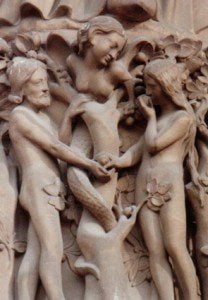The book Theology After Darwin contains a series of essay centered around a simple question: What are the implications for Christian theology if Darwin was right? If we were to take a poll on this blog asking this question I venture to guess that the doctrines of sin and the Fall would top the list of concerns. After all, evolutionary creation calls into question the existence of Adam and Eve as historical individuals and this has serious consequences … or does it?
I have before me four essays or articles that deal with Adam, Eve, and the Fall in one way or another. The next chapter in Theology After Darwin is “Doctrines of the Fall and Sin After Darwin,” written by John J. Bimson who teaches Old Testament at Trinity College Bristol. The recent theme issue of Perspectives on Science and Christian Faith (v. 62 no. 3 2010) Reading Genesis: The Historicity of Adam and Eve, Genomics, and Evolutionary Science contains three articles on related topics: “Adam and Eve as Historical People, and Why It Matters” by C. John Collins, Professor of Old Testament at Covenant Theological Seminary, “After Adam: Reading Genesis in an Age of Evolutionary Science” by Daniel C. Harlow, Professor of Religion at Calvin College, and “Recent Genetic Science and Christian Theology on Human Origins: An “Aesthetic Supralapsarianism.” by John R. Schneider also a Professor of Religion at Calvin College. These last three articles are available for download on the ASA PSCF Discussion blog.
I am going to post on all four of these essays over the next few weeks, but today I want to draw attention to a related video posted yesterday on BioLogos where Peter Enns discusses Adam, Eve, and the Culture Wars. This may help us frame the discussion as we consider the issues in the coming posts.
In this video Dr. Enns puts forth a suggestion that fear is a driving force in at least some of the conflict between science and faith – especially with respect to Adam and Eve. In fact he suggests that fear is the number one issue in his experience. Rather than theological debates we have a conversation that is shaped and dominated by fearful arguments. People are frightened by the prospect that the science will undermine their entire Christian worldview.
While I do see fearful reaction at times, I am not convinced that fear is the driving force suggested in this video. I see a greater role for theological discussion – on biblical grounds centered in the nature of inspiration and on anthropological grounds asking questions about the state of mankind. How did we get into this mess?
Dr. Enns concludes with a crucial point – and here I agree completely. As we consider these questions and work through the theological implications we need to keep the centrality of who Jesus is and of what he did fixed at the fore. We understand the gospel and the bible as a whole only when we read it with Christ at the center.
Christ at center means Adam is not. This figures quite high in my thinking about all of these issues these days. Adam is, when it comes right down to it, only an incidental part of our story – we could wipe Genesis 2-3 out of memory and it wouldn’t change anything of primary significance. We still have human beings responsible for estrangement from God and God pursuing a covenantal relationship with his people. Mankind fails and falls repeatedly in the Old Testament. Paul’s presentation of the gospel in Romans 5 hinges on the sinfulness of mankind and on Christ and his role – it does not hinge on the historicity of Adam. Likewise the central theme of 1 Cor. 15 is not ancient history, but the pivotal event of the resurrection of Jesus, God’s Messiah. Now Adam may be historical, and there may be secondary issues of importance, but our foundation is Jesus – his life, death, and resurrection not Adam. We can step back and have the conversation and the debate.
What do you think? Is fear a driving force in the culture war conflict over evolution and common descent? If not, what do you see as the most significant issues?
If you wish to contact me directly, you may do so at rjs4mail[at]att.net
You can subscribe to a full text feed of my posts at Musings on Science and Theology.










